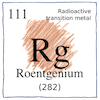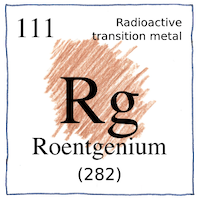Darmstadt—Sigurd Hofmann,
Victor Ninov,
Fritz Peter Heßberger,
Peter Armbruster,
H. Folger,
Gottfried Münzenberg,
H. J. Schött
elements

|
Roentgenium
The team at Darmstadt bombarded bismuth-209 with nuclei of nickel-64 and detected a single atom of roentgenium-272. One neutron had popped out. Then an alpha particle popped out leaving an atom of meitnerium-278. Then another alpha particle popped out of that, leaving an atom of bohrium-274. Then another alpha particle popped out of that, leaving an atom of dubnium-270. But then I don’t know what happened to the dubnium-270, because it can decay in one of three ways, by spontaneous fission, by alpha decay, or by capturing an electron and ejecting a neutrino. Reportedly, however, the team was able to follow the decay chain to lawrencium-256.
Atomic number 111
To King Midas gold became deadly by the power of a wish. Roentgenium, known as eka-gold, would be even more deadly if enough of it could be made with a wish.
In the future
“In the future,” he said,
raising his index finger . . .
In the future, cars will levitate and trains will run on time. In the future, a liberal education will be free, and everyone will vote. In the future, the best wine at restaurants will not be too expensive. In the future, processes that generate energy will render harmful substances harmless. In the future, you will be able to wish away mosquitoes or anything that annoys you. In the future, your happiness will be so great that only tiny things will annoy you. In the future, things that make you happy will also do you good. In the future, what doesn’t kill you will make you stronger.



Roentgenium is the fifth transuranium element first synthesized by scientists working in Darmstadt, Germany, at Gesellschaft für Schwerionenforschung, known today in English as the GSI Helmholtz Centre for Heavy Ion Research. After this, the team synthesized element 112, copernicum.
See also in The book of science:
Readings in wikipedia:
Other readings: